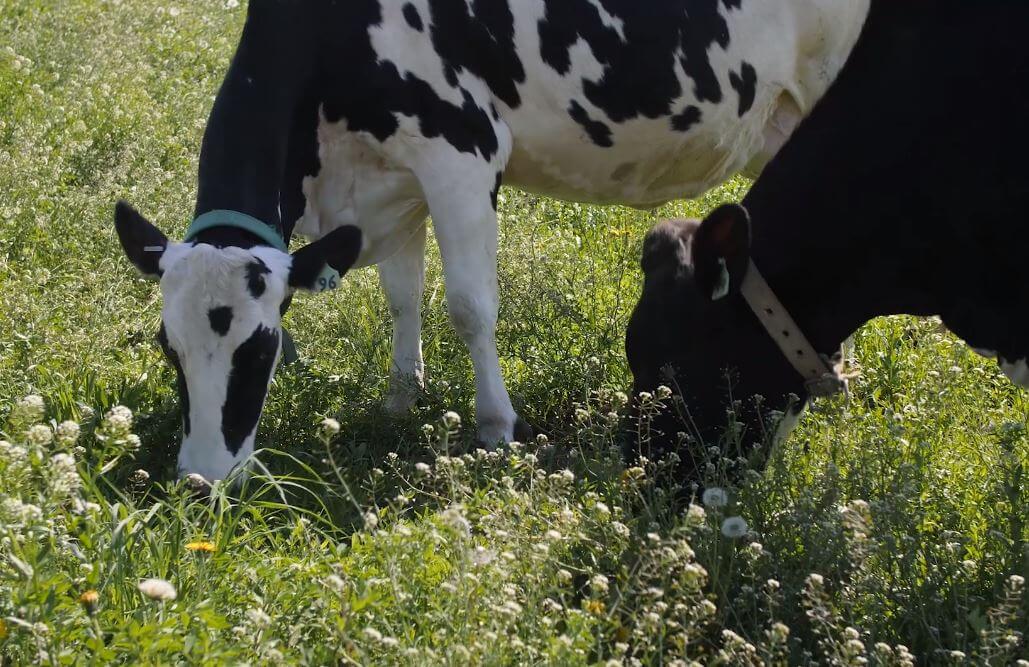
We are grateful that February is Heart Health Month. It provides a dedicated time for us to discuss the benefits of full-fat, grass-fed dairy in a heart-healthy lifestyle. Kalona SuperNatural is committed to producing only organic, grass-fed dairy products, so this topic is close to our hearts. It’s widely known that pasture-grazed dairy is a win for the health of the cows as well as farmers and their land. Less widely known is the fact that organic, full-fat, grass-fed dairy products can actually contribute to improved heart health by providing a diverse set of nutrients including a healthier balance of fatty acids.
Full-fat dairy has long gotten a bad rap for contributing to heart attacks and other cardiovascular diseases. The latter half of the 20th century was synonymous with low-fat diet culture. Skim milk and margarine were staples in the American household. The thought was saturated fats contribute to high cholesterol which was believed to be the cause of heart disease, also referred to as the “diet-heart hypothesis”. Recent research is showing that it’s more nuanced than originally thought. The original research did not take into account “good fat” versus “bad fat” when measuring cholesterol levels. The type of fats and how much is present in dairy vastly varies depending on whether the cows are grain-fed in confined areas or grass-fed on open pastures. Let’s break it down.
Healthy Cows, Healthy Dairy
Fresh pasture provides a higher quantity of readily available nutrients for cows than grain does. This means their milk is jam-packed with higher counts of vitamin E, beta carotene, vitamin K2, conjugated linoleic acid (CLA), and omega-3 fatty acids. While these nutrients promote a healthy heart, omega-3 fatty acids and CLA are the two most recognized as direct contributors.
Humans need a healthy balance of omega-6 (saturated fats) and omega-3 (unsaturated fats) to keep the risk of cardiovascular disease, obesity, and diabetes in check. Recent studies have shown that full-fat dairy from grass-fed cows provides that magic 1:1 ratio, whereas conventional dairy is around 5.7:1. Charles Benbrook, Ph.D., a scholar at the Bloomberg School of Public Health at Johns Hopkins University, emphasizes this point: “The near-perfect balance of omega-6 and omega-3 fatty acids in grass milk dairy products will help consumers looking for a simple, lifestyle options to reduce the risk of cardiovascular and other metabolic diseases.” So go ahead, drink that cup of Kalona SuperNatural Whole Milk!

Good Guts
The connection between gut health and heart health is an important one and full-fat grass-fed dairy plays a role in that as well. If the fat is skimmed from dairy to produce low-fat or non-fat products, key healthy fats and nutrients associated with anti-inflammation are removed in the process. Glycosphingolipids and CLAs can contribute to gut health and have been shown to keep overall body inflammation in check and fight against weight gain. Butyrate is another powerful anti-inflammatory nutrient that can help reduce the inflammation in arteries that eventually leads to plaque build-up. Again, found in grass-fed dairy!
We spoke with Carley Smith, the Fairy Gutmother, and a loyal Kalona SuperNatural consumer. She emphasizes the idea that heart disease relates back to the gut, starting with inflammation. An imbalance or loss of diverse beneficial organisms in the gut leaves our systems open to pathogens, toxins, and disease. Regularly eating grass-fed fermented dairy products like yogurt, cottage cheese, and kefir gives us a dose of lactobacillus. Lactobacillus is a healthy organism that helps ward off pathogens that enter the body. Cows that graze on pasture have a healthier gut biome and that translates to the quality of nutrients in their milk. Bottom line, keeping our guts in check by eating grass-fed dairy is a win for heart health.
Vitamin K2: The Secret Ingredient
This little known nutrient is only found in animal-based foods. It helps to decalcify arteries–effectively reducing the risk of heart disease by consuming more dairy, not less. Vitamin K2 is not in all dairy though — only grass-fed dairy from pastured animals. Butter is one of the best sources of it! Look for dairy products with a golden hue which contains higher levels of K2.
More and more research is coming in about the benefits of grass-fed dairy and how it contributes to whole-body health. We look forward to sharing more information with you along the way.
References
https://extension.umn.edu/dairy-nutrition/grass-fed-cows-produce-healthier-milk
https://www.mofga.org/Publications/The-Maine-Organic-Farmer-Gardener/Fall-2003/Pasture
https://www.cornucopia.org/2018/03/milk-pastured-cows-better/
https://drwillcole.com/butter-health-food-functional-medicine-expert-explains/
https://www.healthline.com/nutrition/grass-fed-butter-superfood-for-the-heart#section1
https://www.healthline.com/nutrition/saturated-fat-good-or-bad#section2
https://www.ncbi.nlm.nih.gov/pmc/articles/PMC427720/
https://www.ncbi.nlm.nih.gov/pmc/articles/PMC4462921/
https://www.ncbi.nlm.nih.gov/pmc/articles/PMC6117398/
https://kalonasupernatural.com/vitamin-k2-and-your-health/
https://www.fairygutmother.com/about-1
